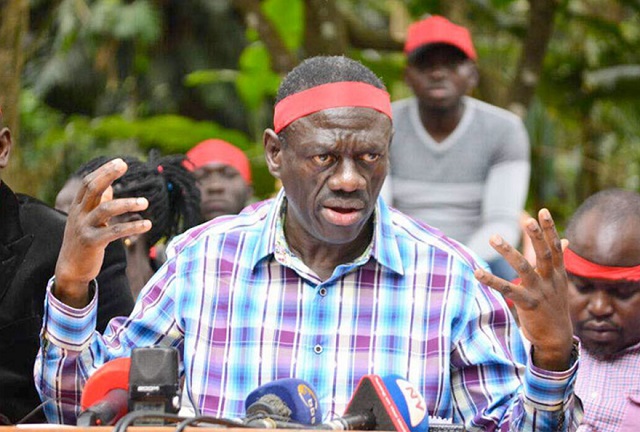
Kampala, Uganda | THE INDEPENDENT | The judiciary has come out to clarify that the petition in which Dr Kizza Besigye wanted a charge of preventive arrest repealed from the Police Act was yesterday dismissed erroneously.
On Monday, a panel of five Constitutional Court judges led by Justice Egonda Ntende dismissed the petition on grounds that Besigye and his lawyers A. F Mpanga and Company Advocates had failed to turn up in court when the matter was coming up for hearing yet they had duly been informed about the date for hearing in September.
Other justices on the panel included Elizabeth Musoke, Cheborion Barishaki, Muzamiru Kibeedi and Irene Mulyagonja.
However, on Monday when URN contacted Besigye’s lawyers on why they had not showed up in court, the lead lawyer David Mpanga said they were not aware that the case was coming up for hearing that day.
Mpanga said instead that they were given a hearing notice on September 28, 2020 requiring them to come to court on October 26, 2020 at 9:30am. He was therefore surprised to learn from the media that his client’s case had been dismissed.
But speaking to URN on Tuesday, the Judiciary spokesperson Solomon Muyita said the court staff erroneously wrote to the lawyers to come on October 26, 2020 when actually the matter was supposed to be heard on October 5 2020.
Muyita added that currently, the Registrar of the Constitutional Court, Mary Babirye who signed the erroneous hearing notice is going to meet with the head of allocation, Justice Egonda Ntende to discuss on how to have the matter rectified.
As such, the Judiciary has owned the mistake with Muyita saying that it was from the court and promising that when the meeting is done, they will be communicating to the parties on the way forward.
Muyita’s colleague, Jameson Karemani had on Monday told URN that if it turns out that indeed the hearing notice given to Besigye’s lawyers had errors, then they can be advised to reinstate the petition.
Earlier in the morning, Besigye’s lawyers wrote to the Constitutional Court Registrar seeking clarification on the dismissal of the petition since they were not aware that it had been scheduled for an earlier date.
The letter indicates that the parties had met on September 9 2020 for conferencing and Besigye had filed his conferencing notes on September 23 2020 and served the Attorney General. It adds that the Attorney General had not yet served them with the government’s submissions and were later informed that the case was to be heard on October 26, 2020.
“We therefore seek clarification as the petition if it was indeed dismissed, should have not been dismissed on account of nonappearance on a date neither counsel nor the petitioner were (not) aware of, and in circumstances where the petitioner has recently taken steps to prosecute the same”, reads the letter jointly drafted by lawyers Mpanga and Ernest Kalibbala.
Mpanga has now told URN, “We are glad that the error has been noted and hope that it will be rectified soon”.
Besigye filed his contentious petition on October 28, 2011 through his lawyers of A.F Mpanga, ten days after he had been arrested during the protests of Walk to Work and put under house arrest on what the police termed as preventive arrest.
The protests in question were started on April 11, 2011 by Activists for Change (A4C) and other opposition politicians who were protesting the high commodity and fuel prices in the country.
Following this, Besigye challenged section 24 of the Police Act which gives police powers to arrest anybody who is about to commit a crime against himself or public.
He also challenged section 26 of the Criminal Procedure Act which also gives police similar powers citing that these sections contravene his constitutional right to liberty, freedom of conscience, expression and assembly.
After the 2016 presidential elections in which he stood and like on previous three occasions he came second, Besigye swore himself in as President of Uganda and was promptly charged with treason.
In 2019, when Besigye was seeking the scrapping of the offence of unlawful assembly, Constitutional Court Justice Kenneth Kakuru declined to grant his petition and advised him to seek remedies in his own courts or the judge who swore him in as President.
******
URN
 The Independent Uganda: You get the Truth we Pay the Price
The Independent Uganda: You get the Truth we Pay the Price



